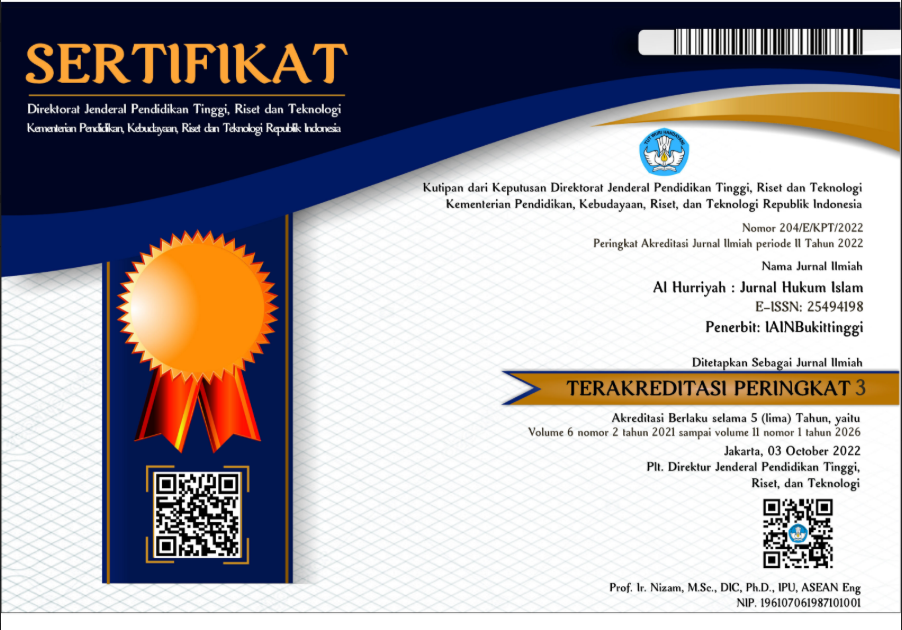EKSISTENSI RAKYU DALAM PENGEMBANGAN HUKUM ISLAM
DOI:
https://doi.org/10.30983/alhurriyah.v1i1.480Abstract
References
Abu Sulaiman, Abdul Wahhab, Dauru Al-Aqli fi Al-Fiqh Al-Islami, terj. Sayid Agil Husin al-Munawwar dan Hadri Hasan, Peranan Akal Dalam Hukum Islam, Semarang: Dina Utama, 1994.
Abdurrahman, Ushul Fiqh, Jakarta: Amzah, 2011.
Abu Dawud, Sunan Abi Daud, Jil.II, Kairo: Mustafa al-Babi al-Halabi, 1952.
al-Fayyumiy, Ahmad bin Muhammad bin Ali al-Mughni, Misbah al-Munir, Jil I, Dar al-Fikr.
al-Tirmizi, Sunan al-Tirmizi, Jil I, Beirut: Dar al-Fikr, 1967.
al-Zarqa, Mustafa Ahmad, al-Ishtishlah wa al-Mashalih al-Mursalah fi Syari’at al-Islamiyah wa Ushul Fiqhiha, Dar al-Qalam, 1988.
al-‘Umurri, Nadiyah Syarif, al-Ijtihad fi al-Islam Ushuluh, Ahkamuh, Afaquh, Muasat al-Risalat, 1979.
Husen, Ibrahim, “Memecahkan Masalah Hukum Baruâ€, dalam Ijtihad Dalam Sorotan, Haidar Baqir dan Syafiq Basri (ed.), Bandung: Penerbit Mizan, 1988.
Khallaf, Abdul Wahhab, Ilmu Ushul Fiqh, Kairo: Maktabah al-Nasr, 1956.
Syarifuddin, Amir, Pembaharuan Pemikiran Dalam Hukum Islam, Padang: Angkasa Raya, 1993.
___________, Ushul Fiqh Jilid 2, Bukit Pamulang Indah: Logos, 1999.
Zahrah, Muhammad Abu, Ushul al-Fiqh, Dar al-Fiqh al-Arabi.
Downloads
Published
How to Cite
Issue
Section
Citation Check
License
Authors who publish with this journal agree to the following terms:
- Authors retain copyright and grant the journal right of first publication with the work simultaneously licensed under a Creative Commons Attribution-ShareAlike 4.0 International License that allows others to share the work with an acknowledgment of the work's authorship and initial publication in this journal.
- Authors are able to enter into separate, additional contractual arrangements for the non-exclusive distribution of the journal's published version of the work (e.g., post it to an institutional repository or publish it in a book), with an acknowledgment of its initial publication in this journal.
- Authors are permitted and encouraged to post their work online (e.g., in institutional repositories or on their website) prior to and during the submission process, as it can lead to productive exchanges, as well as earlier and greater citation of published work (See The Effect of Open Access).





